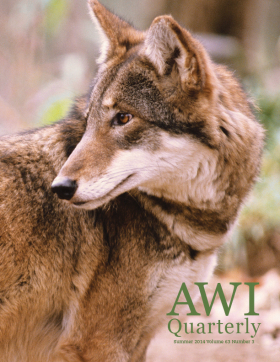
Twenty-seven years ago, the US Fish and Wildlife Service (USFWS) reintroduced captive-bred red wolves to a portion of their native habitat in eastern North Carolina. A species that had been wiped out in the wild began, slowly, to reclaim a portion of its former habitat. That progress was suddenly thrown into reverse when the North Carolina Wildlife Resources Commission decided to open up coyote hunting at night throughout the state. Subsequently, an alarming number of the wolves—who resemble coyotes—were shot and killed. AWI and allies went to court to stop the hunts in the red wolf recovery area—and won. The commission, however, has now set its sights directly on the wolves. It wants USFWS to reevaluate (read: abandon) this so-far successful recovery effort.